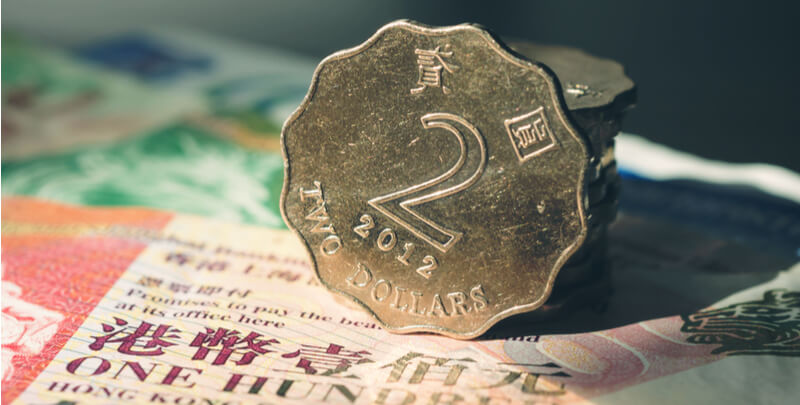ATMs in Hong Kong: Credit cards and fees
Hong Kong is known as a financial capital of the world, so visitors there don’t need to worry too much about being able to access their money. While debit and...

Hong Kong has been a hot destination in tourism for many years, but as word about the territory’s high living standards and seriously low taxation has spread, more and more expats are choosing to make Hong Kong their permanent home. Today, roughly 100,000 of Hong Kong’s inhabitants are foreign nationals.
In a city so rich with financial institutions, international corporations, huge factories, and expansive tourism infrastructure, it’s important to understand Hong Kong’s currency; what it is, how to manage it, and how to spend it. Whether you’re visiting Hong Kong or heading to the Asian nation for good, this guide will give you a complete overview of money and banks in Hong Kong.
Hong Kong’s currency is the Hong Kong dollar. It’s been well established, in one form or another, since the 19th century and is now the 13th most traded currency in the world.
|---|---|
| Names and Nicknames | 港元, dollar, honkie |
| Symbols & abbreviations | HKD, HK$ |
| 1 HKD | One Hong Kong dollar is divided into 100 cents |
| HKD coins | Coins are available in denominations of 10, 20, and 50 cents, as well as HK$1, HK$2, HK$5, and HK$10. |
| HKD banknotes | HKD banknotes are available for HK$10, HK$20, HK$50, HK$100, HK$500, and HK$1000. For their 150th anniversary, HSBC introduced a limited run of HK$150 notes (money printing is largely run by three major banks). These notes are less common, but can be found in Hong Kong. |
While the Hong Kong dollar is the only reliable currency in Hong Kong, some shops will accept Chinese renminbi - but expect to get your change in dollars.
Exchanging money in Hong Kong is fairly straightforward and similar to exchanging money anywhere else, unless you’re exchanging US dollars.
The Hong Kong dollar has been pegged with the United States dollar since 1983, and as a result the exchange rate between HKD and USD remains constant at HK$7.80 to US$1. The Hong Kong Monetary Authority maintains this rate by keeping a large reserve in both HKD and USD and circulates the appropriate number of notes in HKD according to the market rate. While this unique system can seem a bit confusing, it’s actually fairly helpful for US travelers and other expats who can pretty easily identify whether they’re getting a fair deal when they exchange money.
Finding a fair exchange service can be difficult, though the following options are typically your best bet for getting a good deal:
While the first two options typically offer lower exchange rate markups and no upfront fees, there’s still a cost. The second two are exchange services who’ll likely hide some, or all, of their fee in exchange rates that are poorer than the ones you’ll find online.
Wherever you do choose to exchange your money, it’s always important to pay attention to more than just the fees or commission you’re charged. While the service may advertise no fee at all, their money is made with a marked up exchange rate, which is much harder to catch.
If you do a Google search for HKD and your own home currency, you’ll find out what your money is actually worth. And, when you compare that to what the bank or exchange service offer you, you’ll see they nearly always cut you short. A good way to avoid this is by using an online currency converter before you commit to a service, to check the rate you should be getting before you make a transaction.
The currency you’re exchanging will normally dictate whether you’re better off exchanging money before you leave home or after you arrive in Hong Kong. For most major currencies the cheapest and easiest option is to use your bank card at an ATM in Hong Kong.
Hong Kong ATMs often have notoriously good deals for travellers, offering very low or no service fees. On the other hand, getting HKD at a bank in your home country is often associated with a fee between 5-10% depending on where you originate. If you’re exchanging money from the US, the pegged exchange rate means the ATM rate will likely be very close to spot on. If you’re changing money from the UK, Australia, or Europe, you’ll want to keep a closer eye on the rate you’re getting, though using an ATM in Hong Kong is still your best bet.
While damaged banknotes aren’t typically a problem when you use an ATM, if you go to a bank teller, exchange service, or your hotel to get your cash you’ll want to check to make sure your dollars are in good condition.
Many merchants won’t accept severely damaged notes, and may even push back on slightly marred bills. As such, some less-reputable exchange services may try to give you this, essentially, valueless money - recouping their losses on having the note in the first place and leaving you high and dry.
The absolute best rate will come from withdrawing HKD from a Hong Kong bank account, something that’s possible if you have a friend or relative who’s willing to let you piggyback off their bank account.
Sending your friend money with Wise will ensure you get the real mid-market rate - the same one you’ll find on Google - plus a minimal, fair transfer fee that’s explained upfront. All you’ll need to do when you arrive is have your friend waiting with your cash in hand.
Alternatively, with a Wise Borderless account you can hold and manage money in multiple global currencies, including Hong Kong dollars, and by winter 2017, Borderless account holders will be able to get debit cards to accompany their accounts.
These days, traveller’s cheques are very rarely accepted in shops and restaurants, and aren't so simple to cash either. Between their lack of functionality and less-than-favorable rates, you’re better off not getting them at all.
Most major credit and debit card providers are accepted across Hong Kong, though Amex and Discover are significantly less common. At small shops, takeout restaurants, and street food carts, cards may not be accepted at all, so it’s a good idea to carry a small amount of cash with you for convenience.
While many ATMs and points of sale will “helpfully” offer to charge you in your home currency to save you the calculation, this is more often than not a Dynamic Currency Conversion (DCC), which essentially allows the local bank to make up whatever exchange rate they want and pocket the difference. Luckily, it’s easy to choose to be charged in the local currency, even if it means a little more mental math on your end. And choosing to view the transaction and be charged in HKD rather than your home currency means trusting your own bank, who are loyal to you as a customer, and give you a much fairer exchange rate for the day.
To ensure you don’t wind up getting your card shut down for suspicious activity, it’s important to let your bank know that you’ll be travelling - to where and for how long. Given the time difference, if your card does get put on hold, it may be a while before you can chat with a representative to solve the problem.
As a financial and commercial hub, Hong Kong’s banks provide its residents with plenty of locations to manage and withdraw their money. ATMs are widespread, but if you’re looking for one in particular you can try searching with the following tools:
Remember, while ATMs often offer the best exchange rates, that benefit will be lost if you choose to complete your transaction in your home currency instead of HKD.
The ease of banking in Hong Kong is well known, with many local and national institutions vying for business. While the following are the most common banks in Hong Kong, you may find your local bank has a branch in the territory as well; it’s a good idea to check their website before you go.
If you find your bank doesn’t operate in Hong Kong, you may want to check out one of these popular retail banks:
One of the world’s largest international banks, HSBC has a ton of branches and ATMs around Hong Kong, and offers everything from checking accounts to mortgages and personal financing.
Another bank with plenty of branch and ATM options, Standard Chartered offers checking and savings accounts, personal loans, investment products, and more.
A local institution, Public Bank offers its customers a large set of retail and commercial banking services.
Ubiquitous in metro stations and corner stores, the number of Hang Seng ATMs in Hong Kong is staggering. Plus, this bank is well known for currency exchange services.
If you’re looking specifically for international banks, the following are available in Hong Kong:
While banking in Hong Kong is pretty simple, the best thing you can do to protect yourself and your money is thoroughly researching the exchange rate and the services that offer to convert your cash. Whether you’re going on vacation or moving for good, enjoy your time in Hong Kong!
*Please see terms of use and product availability for your region or visit Wise fees and pricing for the most up to date pricing and fee information.
This publication is provided for general information purposes and does not constitute legal, tax or other professional advice from Wise Payments Limited or its subsidiaries and its affiliates, and it is not intended as a substitute for obtaining advice from a financial advisor or any other professional.
We make no representations, warranties or guarantees, whether expressed or implied, that the content in the publication is accurate, complete or up to date.

Hong Kong is known as a financial capital of the world, so visitors there don’t need to worry too much about being able to access their money. While debit and...